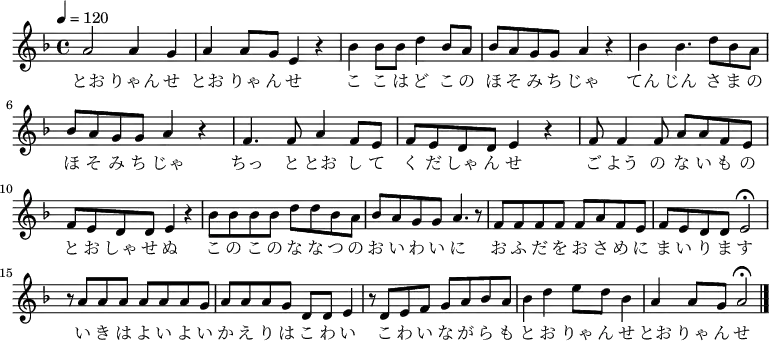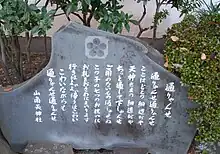"Tōryanse" (通りゃんせ) is the name of the traditional Japanese children's tune (warabe uta). It is a common choice for music played by traffic lights in Japan when it is safe to cross. Tōryanse can be heard in many forms of popular culture, such as at crosswalks in anime.
Lyrics
The words to the song are:
| Japanese: | Romaji: | Translation: |
通りゃんせ 通りゃんせ
|
Tōryanse, tōryanse
|
You may go in, you may enter
|
天神さまの 細道じゃ
|
Tenjin-sama no hosomichi ja
|
This is the narrow pathway of the Tenjin shrine
|
御用のないもの 通しゃせぬ
|
Goyō no nai mono tōshasenu
|
Those without good reason shall not pass
|
|
行きはよいよい 帰りはこわい |
Iki wa yoi yoi, kaeri wa kowai |
Going in is easy, but returning is scary[1] |
こわいながらも
|
Kowai nagara mo
|
It's scary, but
|
Tune

Explanation

There are many theories to the origin of the song, but all agree that it is a portrayal of an exchange between a civilian and a guard manning some sort of a checkpoint – at Kawagoe Castle according to one theory. In the old days when infant mortality was high, people celebrated when a child survived to reach the age of 7 (as well as 3 and 5; see Shichi-Go-San), and ordinary people were only allowed to visit the shrine within the castle compound for special occasions.
This particular warabe uta is sung as part of a traditional game where two children facing each other link their hands to form an arch 'checkpoint', and the remaining children walk through underneath in a line (and back round again in circles). The child who happens to be under the arch when the song finishes is then 'caught', not unlike the Anglophone game "London Bridge Is Falling Down".
The tune being played at Japanese pedestrian crossings is an analogy to this game, i.e., it is safe to cross until the music stops.